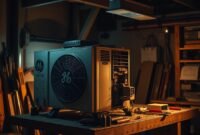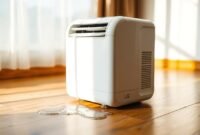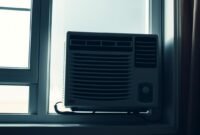Are you tired of your air conditioner shutting off without warning? This issue can make your home hot and uncomfortable. When it happens, it’s a sign that something might be wrong with your AC.
Many people face the problem of their AC units suddenly turning off. The reasons can be anything from not cleaning the filters to more serious problems. Knowing why this happens can help you avoid expensive fixes and keep your home cool.
In this guide, I’ll explain why your air conditioner might be turning off by itself. I’ll help you figure out what’s going on and how to fix it.
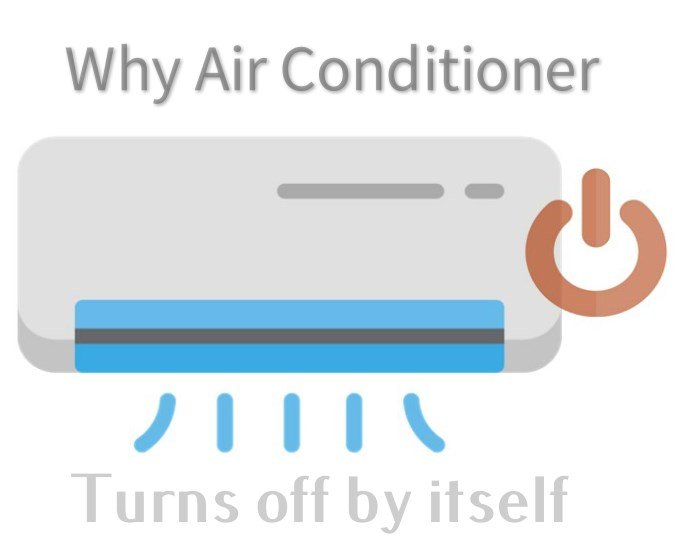
Understanding Short Cycling in Air Conditioning Systems
Air conditioning problems can be really frustrating, like when your system keeps turning off by itself. Short cycling is a common issue that can really affect your home’s comfort and energy use. It happens when your air conditioner turns on and off really fast, causing many problems for your cooling system.
What Causes Short Cycling?
Several factors can make your air conditioner short cycle:
- Oversized AC units that cool spaces too quickly
- Dirty air filters restricting airflow
- Refrigerant leaks or incorrect refrigerant levels
- Malfunctioning thermostat
- Electrical system problems
Effects on Your Home Comfort
When your air conditioner keeps turning off by itself, it messes with your home’s temperature. This constant cycling stops your home from cooling properly. It creates hot spots and uneven temperatures, making your home uncomfortable.
Impact on Energy Bills
Short cycling also makes your energy use go way up. Each time your air conditioner starts up, it uses more electricity than usual. This can increase your energy use by up to 30%, leading to higher bills. Fixing short cycling can help you save money and make your system work better.
When Your Air Conditioner Turns Off by Itself: Common Triggers
It’s frustrating when your air conditioner keeps shutting off. As a homeowner, I’ve seen it happen. These sudden stops are usually signs of bigger problems.
There are a few main reasons why your air conditioner might turn on and then off. Let’s look at the most common ones:
- Dirty Air Filters: Restricted airflow forces your system to work harder and shut down
- Thermostat Malfunctions: Incorrect temperature readings disrupt normal cooling cycles
- Electrical Problems: Faulty wiring or circuit breaker issues can cause sudden stops
- Low Refrigerant Levels: Insufficient refrigerant prevents proper cooling performance
- Dirty Condenser Coils: Accumulated dirt reduces heat transfer efficiency
These issues can stop your air conditioner from working right. Spotting the signs early can avoid bigger problems and costly fixes. Keeping your AC in good shape is key.
If your AC keeps shutting down, get help from a pro HVAC tech. They can find and fix the problem with your system.
Dirty Air Filters and Restricted Airflow Problems
Air filters are key to keeping your home cool and comfy. If you ignore them, you might face big problems. These can stop your home from cooling down right.
Dirty air filters cause a chain of issues for your AC. They block airflow, making your system work too hard. This can make it overheat and wear out parts like the evaporator coil.
Read also: What Causes Air Conditioner Humming Inside?
How to Check Your Air Filters
It’s easy to check your air filters:
- Find the filter spot in your AC unit
- Take out the old filter
- Look for dust, dirt, and color changes
- Hold the filter up to light. If light can’t get through, it’s time for a new one
Maintenance Schedule for Filter Changes
Keeping your filters clean is important. Here’s when to change them:
| Environment | Filter Change Frequency |
|---|---|
| Standard Home | Every 90 days |
| Homes with Pets | Every 60 days |
| Homes with Allergies | Every 30-45 days |
Impact of Dirty Filters on System Performance
Not changing filters can hurt your AC’s performance. It can make it less efficient, use more energy, and even break down. Regular filter checks can help your AC last longer and work better.
Thermostat Issues and Placement Concerns
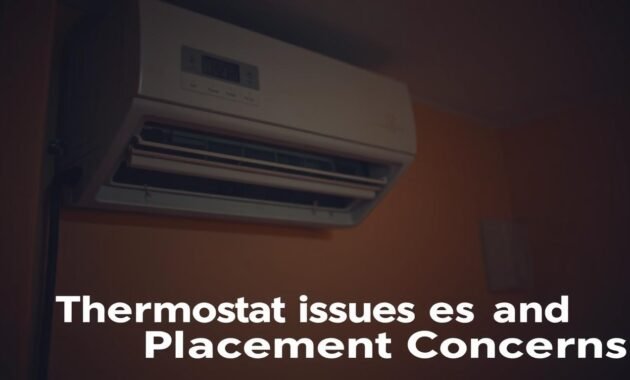
Understanding thermostat problems is key when your air conditioner acts strangely. In cars like the Dodge Journey and Ford Fusion, thermostat issues might be the main problem. This is if the air conditioner turns on by itself.
Where you place the thermostat affects AC performance. I found that thermostats near heat, sunlight, or drafts can give wrong temperature readings. This can make the AC cycle on and off unexpectedly, which is a big problem in cars with sensitive computer sensors.
- Keep thermostats away from direct sunlight
- Avoid placing near heat-generating appliances
- Ensure proper distance from air vents
- Check for direct drafts that might affect readings
If your Dodge Journey or Ford Fusion’s air conditioner turns on by itself, it might be the sensors. Modern car AC systems need exact electronic measurements. Even small sensor problems can cause weird behavior.
| Vehicle Model | Common Thermostat Issues | Potential Solutions |
|---|---|---|
| Dodge Journey | Sensor miscalibration | Professional diagnostic check |
| Ford Fusion | Electronic sensor errors | Reset AC computer system |
I suggest getting regular professional checks to keep your thermostat working right. Smart thermostats can offer better temperature control and help find AC cycling problems.
Electrical Problems That Cause AC Shutdowns
Electrical issues can make your AC turn off without warning. These problems range from small connection issues to big system failures. These need a pro to fix.
Electrical problems in your AC can cause it to shut down often. This makes your home less comfortable. Knowing these issues helps you find and fix the problem fast.
Read also: LG Portable Air Conditioner Compressor Keeps Shutting Off
Circuit Breaker Issues
Circuit breaker problems often cause AC shutdowns. These can happen for a few reasons:
- Overloaded electrical circuits
- Loose electrical connections
- Aging electrical panel components
Wiring Problems
Bad or loose wiring can cut off power to your AC. This can lead to shutdowns and safety risks.
- Frayed or damaged wire insulation
- Loose electrical connections
- Corrosion at connection points
Run Capacitor Failures
The run capacitor is key to your AC’s work. If it fails, your AC might shut off suddenly. Look out for these signs:
- Sudden system shutdowns
- Humming sounds from the outdoor unit
- Difficulty starting the compressor
If your AC keeps shutting down, get a pro HVAC tech to check it. Trying to fix it yourself can be risky and might break your warranty.
The Role of Refrigerant Levels in AC Performance
When your air conditioner turns on by itself, refrigerant levels might be the issue. Refrigerant is key to your cooling system. It absorbs heat and keeps your home cool.
Low refrigerant levels can harm your air conditioning system. These levels often drop because of leaks. A leaky refrigerant charge messes up the cooling process, leading to odd system behaviors.
- Signs of low refrigerant include:
- Reduced cooling efficiency
- Ice buildup on evaporator coils
- Inconsistent temperature control
If your air conditioner turns on by itself, get a professional check. Refrigerant handling is best left to experts. Certified HVAC technicians can:
- Detect refrigerant leaks
- Measure current refrigerant levels
- Safely recharge the system
- Prevent future performance issues
It’s a myth that refrigerant needs regular topping up. Any loss means there’s a problem that needs a pro’s help.
Condenser and Evaporator Coil Problems
Your air conditioning system’s performance depends a lot on its condenser and evaporator coils. These parts are key to cooling your home well. If they get dirty, your AC won’t cool as well, leading to extra wear and tear.
Identifying Dirty Coil Warning Signs
Spotting dirty coils early can save you money and keep your AC running smoothly. Look out for these signs:
- Reduced cooling performance
- Increased energy consumption
- Unusual noises from the AC unit
- Frost or ice buildup on coils
- Uneven cooling throughout your home
Professional Cleaning Techniques
Experts use special methods to clean coils well. These include:
- Chemical cleaning solutions
- Compressed air treatments
- High-pressure water rinse
- Specialized coil cleaning brushes
Preventive Maintenance Strategies
To keep coils clean and your system running well, follow these tips:
| Maintenance Action | Frequency | Benefit |
|---|---|---|
| Regular filter replacement | Every 1-3 months | Reduces dust and debris buildup |
| Annual professional inspection | Once per year | Comprehensive system check |
| Keep surrounding area clean | Ongoing | Minimizes external contaminants |
By following these steps, you can keep your AC system in top shape. This ensures it cools your home efficiently and effectively.
How an Oversized AC Unit Affects System Operation
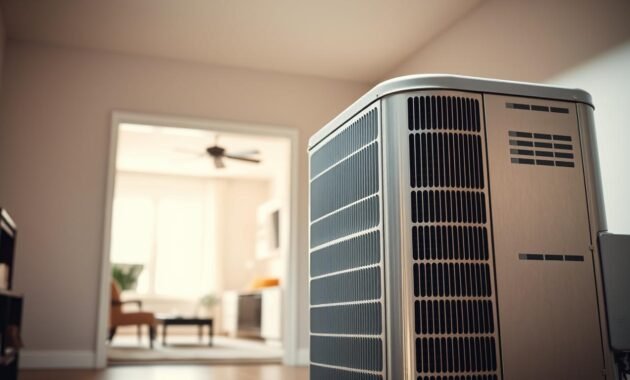
When it comes to cooling your home, bigger isn’t always better. An oversized air conditioning unit can create significant problems for your energy efficiency and home comfort. I’ll explain why choosing the right-sized AC is key for optimal performance.
An oversized AC unit might seem like a good idea, but it actually creates multiple challenges for your cooling system. The unit cools your home too quickly, causing frequent start-stop cycles known as short cycling. This rapid cycling prevents proper humidity control and increases wear on your system.
- Rapid cooling without proper dehumidification
- Increased energy consumption
- Uneven temperature distribution
- Premature system breakdown
Energy efficiency suffers dramatically with an oversized unit. The constant stopping and starting means your system works harder without effectively cooling your home. This leads to higher electricity bills and unnecessary strain on your air conditioning equipment.
| AC Unit Size | Cooling Efficiency | Energy Consumption |
|---|---|---|
| Properly Sized | Optimal | Low |
| Oversized | Poor | High |
Professional HVAC technicians can help you determine the right AC unit size for your specific home. They’ll calculate the perfect cooling capacity based on square footage, insulation, and local climate conditions. Investing in the correct size ensures better energy efficiency and a comfortable living environment.
Professional Maintenance and Repair Solutions
Keeping your air conditioning system running smoothly is key. Regular check-ups can help a lot. They reduce wear and tear on important parts like the evaporator coil.
Professional HVAC technicians offer great service packages. These visits include:
- Detailed electrical connection inspections
- Thorough cleaning of evaporator coil
- Refrigerant level assessments
- Comprehensive system performance evaluation
Experts can spot issues early during these visits. This helps avoid big problems and keeps your AC working well for longer.
It’s smart to get professional maintenance once a year. This is best before summer hits. HVAC pros often suggest a spring tune-up to keep your system efficient.
Getting regular maintenance might seem pricey. But it really saves money over time. It cuts down on energy use, prevents expensive fixes, and keeps your AC in top shape for years.
Conclusion
Knowing why your air conditioner turns off by itself can prevent hot summer surprises. This guide has covered many reasons, from dirty filters to electrical issues.
Regular maintenance is your best defense against AC shutdowns. Watch for warning signs and fix problems quickly. Simple actions like changing filters and checking thermostat settings can help. Also, don’t forget to schedule professional inspections.
If your air conditioner keeps turning off, get professional help. HVAC technicians can find and fix complex problems. A well-maintained AC keeps you comfortable, saves energy, and lasts longer.
Proactive care is essential for a comfortable home and a working air conditioner. Stay informed and watchful to avoid breakdowns. This way, you’ll have reliable cooling when you need it most.
